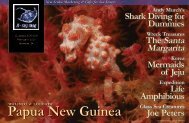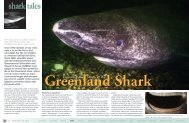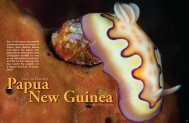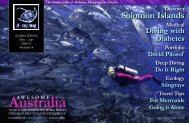Medium resolution version of X-Ray Magazine (96 dpi)
Medium resolution version of X-Ray Magazine (96 dpi)
Medium resolution version of X-Ray Magazine (96 dpi)
Create successful ePaper yourself
Turn your PDF publications into a flip-book with our unique Google optimized e-Paper software.
pr<strong>of</strong>ile<br />
Dr Sylvia Earle<br />
a film about fish. Now, a film about lions...<br />
we got lots <strong>of</strong> films about lions; tigers...<br />
lots <strong>of</strong> films about tigers; sharks...there<br />
have been a number <strong>of</strong> films about<br />
sharks. But in this case, we convinced the<br />
National Geographic Society to choose<br />
one <strong>of</strong> the other big predators in the<br />
sea. And I just want to share with you the<br />
opening sequence from this film. It runs a<br />
full hour, and I only have a few minutes<br />
to stand here in front <strong>of</strong> you and show<br />
you some <strong>of</strong> these images. But let me<br />
start with this one. (The following is the<br />
script <strong>of</strong> the film clip)<br />
NARRATOR: “We call it the blue planet,<br />
yet the creatures we know best rule the<br />
land. But one <strong>of</strong> nature’s most impressive<br />
creatures is an ocean dweller <strong>of</strong>ten<br />
missed and seldom understood... Swifter<br />
than a dolphin... A hunter as bold as the<br />
Great White shark... The Blue fin tuna is<br />
perfection made<br />
real. Designed<br />
for speed, it<br />
races the currents<br />
at 50 miles<br />
an hour—one <strong>of</strong><br />
the fastest swimmers<br />
in the sea.<br />
A warm-blooded<br />
giant, it crosses<br />
whole oceans at<br />
will spanning the<br />
seas on epic journeys.”<br />
DR SYLVIA EARLE:<br />
“The ultimate<br />
fish has to be<br />
the Blue fin tuna.<br />
Those creatures<br />
that can power<br />
their way across<br />
the whole ocean<br />
basin. That has to<br />
be the supreme<br />
creature unlike<br />
any other on<br />
earth.”<br />
NARRATOR:<br />
“But the Blue fin<br />
tuna is hunted<br />
whereever it<br />
goes. And there is<br />
a serious debate<br />
about the consequences.”<br />
SCIENTIST: “I sincerely believe the Blue<br />
fin tuna is now in a state <strong>of</strong> crisis. All our<br />
people should know that what we did to<br />
the buffalos on land, we are doing to big<br />
wild animals in the ocean.”<br />
NARRATOR: “On the front line <strong>of</strong> the controversy<br />
is a small group <strong>of</strong> scientists struggling<br />
to learn the secrets <strong>of</strong> the Blue fin<br />
as quickly as they can. For them, there is<br />
even more at stake than the legendary<br />
animal itself.”<br />
DR SYLVIA EARLE: “If the ocean is in trouble,<br />
our future is in trouble. These creatures<br />
are the lions, the tigers, the wolves,<br />
the eagles <strong>of</strong> the ocean.”<br />
NARRATOR: “It is a creature so<br />
advanced, its deepest secrets may<br />
always ellude us.” (end <strong>of</strong> clip)<br />
Well, there you go. It’s the Blue fin<br />
tuna—a fish that many people love. It is<br />
so rare to see them other than as sushi or<br />
sashimi. The taste for tuna in the last half<br />
century has grown to a state right now<br />
where their numbers have significantly<br />
declined.<br />
Imagine that within less than 50 years,<br />
we managed to whittle down their numbers<br />
from what they were when some <strong>of</strong><br />
us were kids to a fraction <strong>of</strong> their former<br />
numbers. It is because our taste for<br />
them is at a point where our technology<br />
has reached a level where we can<br />
find and bring to market every last one,<br />
should we choose to do so. It seems preposterous.<br />
When I was a child, and even now,<br />
many believed that the ocean was infinite<br />
in its capacity to yield back to us<br />
whatever we wanted to take out and<br />
to absorb whatever we wanted to put<br />
in. And perhaps the greatest discovery<br />
about the ocean in the last century has<br />
been first <strong>of</strong> all that the ocean really is<br />
at the heart <strong>of</strong> what makes the planet<br />
work—the cornerstone <strong>of</strong> our life support<br />
NOAA<br />
Dr Sylvia Earle and the dive supervisor discuss plans for the next dive<br />
system. But the second big discovery is<br />
that we do have the capacity to alter<br />
the way the it works, to really diminish<br />
creatures that once seemed to be infinite<br />
in their capacity to rebound no matter<br />
how many we extracted.<br />
It’s a hard thing for most people to<br />
face up to especially when our numbers<br />
are growing and prospering at such a<br />
rate. Population on our planet has tripled<br />
in my lifetime, that is, human population.<br />
While all other species, our fellow creatures,<br />
are diminishing in their numbers.<br />
Not all creatures, but certainly some <strong>of</strong><br />
them that we have particularly targeted<br />
for taking.<br />
So, what do we do about it? The first<br />
step is knowing. If you understand that<br />
there is a problem, there is a chance<br />
that you might care, and if you care, you<br />
might do something about it. If you don’t<br />
know, you can’t care. And that is the<br />
idea that the ocean is not infinitely preserved;<br />
that we do have the capacity to<br />
change the way the ocean works. And<br />
that it does matter to us, it comes back<br />
to us. It doesn’t just matter to the fish and<br />
the whales and the turtles and the sharks.<br />
It matters to us, because we, too, are<br />
connected to all that blue stuff out there<br />
that governs the way the ocean works.<br />
I want to give you one other example.<br />
I know that both in this conference, and<br />
over the years that this conference has<br />
been carried out, the focal point has<br />
been the fate <strong>of</strong> sharks. Oh, I certainly<br />
remember as a kid, the feeling was that<br />
really the only good shark was a dead<br />
shark. And a lot <strong>of</strong> people thought they<br />
were really doing a great thing if they<br />
would exterminate every shark that they<br />
could find. And the problem was, you<br />
know, that people thought that sharks<br />
were man-eaters—<strong>of</strong> course, I didn’t<br />
worry about that, because <strong>of</strong> my gender,<br />
I didn’t qualify. But now, the problem is,<br />
man eating sharks.<br />
You know, lots <strong>of</strong> them, millions <strong>of</strong><br />
sharks, are munched on by us. And<br />
every once in a while, they turn around<br />
83 X-RAY MAG : 6 : 2005 EDITORIAL FEATURES TRAVEL NEWS EQUIPMENT BOOKS SCIENCE & ECOLOGY EDUCATION PROFILES PORTFOLIO CLASSIFIED
















